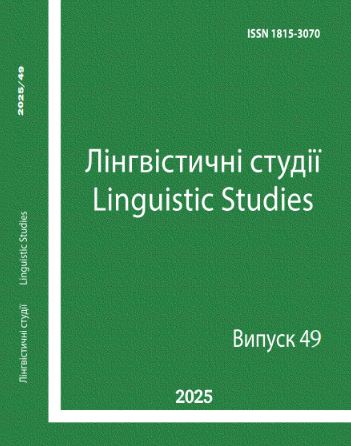Tendencies to ignoration, melioration and pejoration of obscenity in english-ukrainian and ukrainian-english literary translations
DOI:
https://doi.org/10.31558/1815-3070.2025.49.10Keywords:
obscenity, profanity, translation decision, equivalent, literary translation, linguocultureAbstract
The article examines cases of incorrect transmission of obscenity - ignoring, melioration and pejoratisation - in the Ukrainian-English translation of O. Zabuzhko's novel The Museum of Abandoned Secrets and the English-Ukrainian translations of T. Gerritsen's The Surgeon and A. Michaelides' The Silent Patient. The analysis of the sample has revealed that these cases are based on four types of translation decisions that Ukrainian translators (N. Goin, Y. Pidhorna, and N. Shevchuk-Murray) use when reproducing the scene vocabulary in the novels under study: 1) ignoring the obscenity; 2) inadequate rendering of obscenity words/phrases; 3) partial translation of obscenity vocabulary (incomplete equivalence); 4) fairly complete reproduction of obscenity (full equivalence). It has been found that translation decisions are influenced to a certain extent, on the one hand, by reclamation factors as vestiges of the Soviet past in Ukrainian linguistics, and, on the other hand, by the vulgarisation of Ukrainian society associated with the processes of globalisation, democratisation and liberalisation of the latter and the current Russian-Ukrainian war.
References
Гаврилів, О. Німецько-український словник лайливих слів. Львів : Апріорі, 2005. 144 с. [Havryliv, O. (2005). Nimetsko-ukrainskyi slovnyk lailyvykh sliv [German-Ukrainian dictionary of opprobrious words]. Lviv : Apriori. (In Ger.).]
Джагатія, А., Едвардс, К. Чому ми так любимо лаятися. ВВС News Україна, 08.05.2021. URL https://www.bbc.com/ukrainian/features-57010421 [Dzhahatiia, A., Edvards, K. Chomu my tak liubymo laiatysia. ВВС News Ukraine, 08.05.2021. Aviable at : https://www.bbc.com/ukrainian/features-57010421 (In Ukr.).]
Етимологічний словник української мови. Т. 3. Київ : Наукова думка, 1989. 553 с. [Etymolohichnyi slovnyk ukrainskoi movy. T. 3. [Etymological Dictionary of the Ukrainian Language. Vol. 3]. (1989). Kyiv : Naukova dumka. (In Ukr.).]
Квеселевич, Д. И. Самый полный словарь ненормативной лексики. Москва : Астрель; АСТ, 2011. 1021 с. [Kveselevich, D. I. (2011). Samyj polnyj slovar’ nenormativnoj leksiki [The most complete dictionary of abnormative vocabulary]. Moskva : Astrel’; AST]
Матюшенко, О. С., Туришева, О. О. Особливості перекладу нецензурної лексики в субтитрах до кінофільму «Fack ju Goethe». Новітня лінгвістика/Advanced Linguistics. 2020. Вип. 5. С. 54–61. [Matiushenko, O.S., Turysheva, O.O. (2020). Osoblyvosti perekladu netsenzurnoi leksyky v subtytrakh do kinofilmu «Fack ju Goethe» [Peculiarities of translating obscene words in film subtitles «Fack ju Goethe»]. In : Novitnia linhvistyka/Advanced Linguistics, 5, 54–61. (In Ukr.).]
Мізін, К. Англо-український словник компаративної фразеології. Кременчук : Щербатих О.В., 2010. 120 с. [Mіzіn, K. (2010). English-Ukrainian dictionary of comparative phraseology. Kremenchuk : Shcherbatykh. (In Eng.).]
Мізін, К. Лексико- й фразеографічні проблеми крізь призму зіставлення мов та інноваційні спроби їхнього розв’язання. Lexikografische Innovation – Innovative Lexikografie: bi- und multilinguale Wörterbücher in Gegenwart und Zukunft: Projekte, Konzepte, Visionen / D. Scheller-Boltz, H. Weinberger (Hg.). Hildesheim; Zürich; New York: Georg Olms Verlag, 2017. S. 215–229. [Mizin, K. (2017). Leksyko- i frazeohrafichni problemy kriz pryzmu zistavlennia mov ta innovatsiini sproby yikhnoho rozviazannia [Lexical and phraseographic issues in the light of contrasting languages and innovation attempts to solve them]. In: Scheller-Boltz, D., Weinberger, H. (Hg.). Lexikografische Innovation – Innovative Lexikografie: bi- und multilinguale Wörterbücher in Gegenwart und Zukunft: Projekte, Konzepte, Visionen. (S. 215– 229). Hildesheim; Zürich; New York: Georg Olms Verlag. (In Ukr.).]
Мізін, К. І. Причини неадекватного відтворення обсценної лексики в німецькоукраїнських перекладах. Львівський філологічний часопис. 2021. № 10. С. 91–97. DOI: https://doi.org/10.32447/2663-340X-2021-10.14 [Mizin, K.I. (2021). Prychyny neadekvatnoho vidtvorennia obstsennoi leksyky v nimetskoukrainskykh perekladakh [Reasons for an inadequate conveying obscene lexicon in the GermanUkrainian translations]. In : Lvivskyi filolohichnyi chasopys [Lviv Philological Journal], 10, 91–97. DOI: https://doi.org/10.32447/2663-340X-2021-10.14 (In Ukr.).]
Ставицька, Л. Українська мова без табу. Словник нецензурної лексики та її відповідників. Київ : Критика, 2008. 456 c. [Stavytska, L. (2008). Ukrainska mova bez tabu. Slovnyk netsenzurnoi leksyky ta yii vidpovidnykiv [Ukrainian language without taboo. Dictionary of obscene vocabulary and its matches]. Kyiv : Krytyka. (In Ukr.).]
Тавровецька, Н., Шебанова, В. Крос-культурне дослідження вживання обсценної лексики у молодіжному середовищі. Psycholinguistics. 2020. Vol. 28, Iss. 1. С. 239–266. [Tavrovetska, N., Shebanova, V. (2020). Kros-kulturne doslidzhennia vzhyvannia obstsennoi leksyky u molodizhnomu seredovyshchi [Cross-cultural research of the use of obscene lexica in the youth environment]. Psycholinguistics, 28 (1), 239–266. (In Ukr.)]
Ткачівська, М. Р. Культурно-емотивні закономірності відтворення лексики обмеженого вжитку в українсько-німецькому художньому перекладі: дис. … докт. філол. наук. ІваноФранківськ; Харків, 2021. 674 с. [Tkachivska, M.R. (2021). Kulturno-emotyvni zakonomirnosti vidtvorennia leksyky obmezhenoho vzhytku v ukrainsko-nimetskomu khudozhnomu perekladi [Cultural and emotional regularities of rendering lexis of limited usage in Ukrainian-German fiction translation]. (Dys. … dokt. filol. nauk). Ivano-Frankivsk; Kharkiv. (In Ukr.).]
Факт: факти, аналітика, коментарі, тенденції (06.01.2025). Коли президент говорить «як є»: ненормативна лексика стала нормою для політичних лідерів України. URL: https://factnews.com.ua/koli-prezident-govorit-yak-e-nenormativna-leksika-stala-normoyu-dlyapolitichnih-lideriv-ukraini [Fakt: fakty, analityka, komentari, tendentsii (06.01.2025). Koly prezydent hovoryt «iak ye»: nenormatyvna leksyka stala normoiu dlia politychnykh lideriv Ukrainy. URL: https://factnews.com.ua/koli-prezident-govorit-yak-e-nenormativna-leksika-stala-normoyu-dlyapolitichnih-lideriv-ukraini (In Ukr.).]
Форманова, С. В. Інвективи в українській мові. Київ : ВД Дмитра Бураго, 2012. 335 с. [Formanova, S.V. (2012). Invektyvy v ukrainskii movi [Invectives in the Ukrainian language]. Kyiv : PH Dmytro Buraho. (In Ukr.).]
Byrne, E. (2018). Swearing Is Good for You: The Amazing Science of Bad Language. New York: W. W. Norton.
Cachola, I., Holgate, E., Preotiuc-Pietro, D., & Jessy, Li J. (2018). Expressively vulgar: The sociodynamics of vulgarity and its eff ects on sentiment analysis in social media. Proceedings of the 27th International Conference on Computational Linguistics (pp. 2927–2938). Santa Fe, New Mexico.
Cambridge Dictionary. Available at: https://dictionary.cambridge.org
Gauger, H.-M. (2012). Das feuchte und das Schmutzige. Kleine Linguistik der vulgären Sprache. München: Beck.
Intelligent Web-based Corpus. Available at: https://www.english-corpora.org/iweb/
Jontes, G. (2014). Das neue, österreichische Schimpfwort-ABC. Graz: Steirische Verlagsgesellschaft.
Kamer, F. (2003). Teiggaff, Tüpfi, tumme Siech. Schimpfen und Fluchen im Schweizerdeutschen. Mit einem Nachwort von Andreas Lötscher. Frauenfeld; Stuttgart; Wien: Huber.


